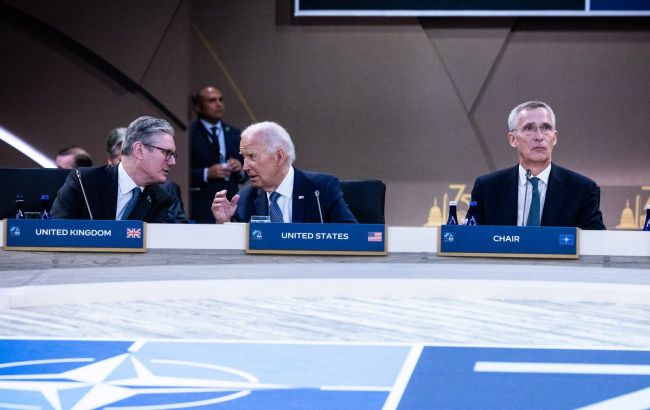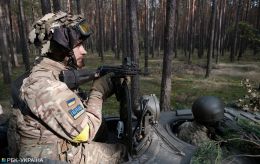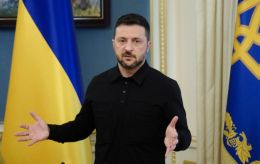F-16s on the way and powerful communiqué: Results of NATO summit day two, anticipations for final day
 Photo: British Prime Minister Keir Starmer, US President Joe Biden and NATO Secretary General Jens Stoltenberg at the summit in Washington (nato.int)
Photo: British Prime Minister Keir Starmer, US President Joe Biden and NATO Secretary General Jens Stoltenberg at the summit in Washington (nato.int)
The NATO summit in Washington is ending, and it seems that the main statements for Ukraine have already been made. However, the third day promises to be no less interesting.
RBC-Ukraine summarizes the second day of the summit and outlines what to expect today.
Contents
- Key points of the NATO summit declaration regarding Ukraine
- Good news - F-16s already on their way
- Defense cooperation and first contract with Denmark
- Announcements of additional aid from partners
- NATO summit third-day expectations
Key points of the NATO summit declaration regarding Ukraine
The final declaration contains around 60 mentions of Ukraine. Notably, it states that Russia's full-scale invasion has undermined global security, with the aggressor being identified as a direct threat to NATO countries.
Allies approved the establishment of the NATO Security Assistance and Training Service for Ukraine (NTASU), which aims to provide permanent assistance. This new structure will operate in NATO countries to support Ukraine's self-defense efforts. NTASU will not make NATO a party to the conflict but will ensure the transformation of Ukraine's Defense Forces within the integration framework with the North Atlantic Alliance.
Long-term assistance in the supply of military equipment and the creation of forces capable of resisting Russian aggression was also announced. NATO countries will make proportional contributions to ensure basic funding of 40 billion euros by 2025.
The commitments extend to:
- Procurement of military equipment for Ukraine
- Material assistance
- Maintenance, logistics, and delivery of military equipment
- Military training of the Armed Forces
- Investments and support for Ukraine's defense industry
- All contributions to trust funds, including non-lethal assistance
Allies will report twice a year. The contributions of the NATO countries will be reviewed at future NATO summits starting in 2025.
Additionally, progress has been made in launching the Joint NATO-Ukraine Analytical, Training, and Educational Center (JATEC). A decision was also made to appoint a senior NATO representative in Ukraine.
The communiqué emphasizes the irreversibility of NATO membership. It highlights the progress made since the 2023 summit in Vilnius.
"As Ukraine continues this vital work, we will continue to support it on its irreversible path to full Euro-Atlantic integration, including NATO membership," the statement reads.
The focus is on NATO's sending an invitation once conditions are met and consensus among allies is achieved. The summit decisions and ongoing efforts form a "bridge" to Ukraine's membership.
Polish President Andrzej Duda believes there is hope for inviting Ukraine as early as the 2025 summit, which will be held in The Hague (Netherlands).
For the first time, China has been identified as a decisive factor contributing to Russia's war against Ukraine. NATO calls Beijing to stop supplying components, equipment, and essential raw materials for Russia's military-industrial base. Official Beijing considers the accusations "provocative and containing blatant lies and slander."
It is also emphasized that Russia has intensified hybrid aggression against NATO members through acts of sabotage, violence, border provocations, disinformation campaigns, etc. If these reach the level of an armed attack, the Alliance is ready to invoke Article 5 on collective defense.
Good news - F-16s already on their way
At the summit, news about the multi-role F-16 fighter jets was discussed. According to US Secretary of State Antony Blinken, the first units for Ukraine are already on their way.
"I'm also pleased to announce that as we speak, the transfer of F-16 jets is underway, coming from Denmark, coming from the Netherlands," he said.
In a joint statement by US President Joe Biden and the Prime Ministers of Denmark and the Netherlands, Mette Frederiksen, and Mark Rutte, it was confirmed that the transfer process had begun, and the first F-16s will start flying in Ukraine this summer. No further details are provided for security reasons.
Ukrainian President Volodymyr Zelenskyy called this a clear signal that Russia's ability to terrorize Ukrainians will be reduced. F-16s will help defend against attacks like the one on July 8 at the Okhmatdyt children's hospital in Kyiv.
According to him, the current needs of the Air Force are estimated at 128 aircraft. As of now, there are decisions regarding 10-20 fighters.
Denmark previously promised to transfer 19 aircraft, the Netherlands 24, and Belgium 30. Yesterday, Norwegian Prime Minister Jonas Gahr Støre announced that his country would transfer six F-16 fighters starting in 2024. Thus, 79 promised aircraft are expected, with deliveries naturally spread over time.
It also became known that Ukraine itself paused the issue of transferring Gripen fighters. According to Swedish Foreign Minister Tobias Billström, focusing on F-16s has nothing to do with the Swedish government's decision.
"This decision was made because Ukraine concluded that having two aircraft systems simultaneously - both F-16 and Gripen - was too much," he said, adding that Stockholm is not closed to possible supplies in the future.
Defense cooperation and first contract with Denmark
President Zelenskyy met with representatives of US defense companies. They discussed joint production of ammunition, air defense systems, artillery, armored vehicles, drones, and the repair and maintenance of military equipment.
Defense Minister Rustem Umerov, following meetings with colleagues from Denmark and the Netherlands, announced the creation of a Defense Fund. He said creating joint ventures is a priority, and Ukraine is interested in investing in weapons production.
He also noted that Denmark became the first country to directly finance production in Ukraine. As a result, the first contract has already been signed.
According to the Danish Ministry of Defense, Copenhagen ordered 18 self-propelled artillery systems Bohdana, for the Armed Forces of Ukraine. They are expected to be delivered in the coming months.
"This provides some obvious logistical advantages while helping build up Ukraine's defense industry. This is where Ukrainian-made artillery systems play a central role as a pilot project," said Minister Troels Lund Poulsen, expressing hope that the Danish model would serve as an example for other countries.
A 1.2 billion Danish kroner, or 160 million euros in European currency, has been allocated for the procurement.
Announcements of additional aid from partners
Several representatives of NATO countries also announced additional aid. Portuguese Prime Minister António Costa stated that aid this year would reach €220 million and the same amount in 2025.
At a meeting with Zelenskyy, Canadian Prime Minister Justin Trudeau announced a military package worth CAD 500 million (approximately USD 366 million). The parties also discussed cooperation within the fighter jet coalition. The Canadian side is expected to join the Ukrainian pilot training on flight simulators.
The Netherlands will allocate €300 million to purchase ammunition for the F-16s that Ukraine will soon receive. This amount is in addition to the €150 million previously allocated.
"With the ammunition we purchase, F-16s can help repel Russian attacks. Putin's aggression knows no bounds, so our support must continue at full speed," emphasized Defense Minister Ruben Brekelmans.
NATO summit third-day expectations
The third day of the NATO summit has a busy agenda. At 5:00 PM Kyiv time, the North Atlantic Council meeting will begin at the level of heads of state and government of NATO member countries, the Indo-Pacific region, and the European Union.
Then, at 9:00 PM, the NATO-Ukraine Council will meet, and two and a half hours later, Secretary General Jens Stoltenberg will hold a closing press conference.
Yesterday, Ukraine signed a security cooperation agreement with Luxembourg on the summit's sidelines. The document states that Luxembourg allocated €80 million this year for defense aid and committed to maintaining this dynamic over 10 years. Additionally, the IT coalition will provide opportunities for leading educational institutions in the cybersecurity field.
Separate sections of the agreement address attracting investors to Ukraine's defense industry, supporting refugees, and efforts to release Ukrainian prisoners and deported children from Russia. Luxembourg, as one of the founding countries of the Alliance, reaffirms its commitment to Ukraine's NATO membership.
Yesterday, President Zelenskyy announced signing a security agreement with another country. Information about which country is not yet available, but it is likely that there will be news today.
Zelenskyy is expected to meet with US President Joe Biden before the NATO-Ukraine Council meeting. According to the White House, the meeting will occur at the convention center where the summit sessions are being held at 8:30 PM Kyiv time. This will be the third meeting of the leaders in recent months.
One topic will likely be US permission for strikes on military airfields on Russian territory. Foreign Minister Dmytro Kuleba previously announced contacts with American officials regarding this issue.
Notably, Speaker of the House of Representatives Mike Johnson, a recent opponent of aid to Ukraine, has already supported lifting the restrictions. According to him, the Defense Forces should fight as they see fit, and "that's what Congress intended." Whether the Ukrainian delegation will achieve its goal during this visit to Washington will become known shortly.
For more details on other outcomes of the NATO summit, including partner decisions on the transfer of additional Patriot systems, read an article by RBC-Ukraine.
Sources: text of the NATO summit's final communiqué, statements by President of Ukraine Volodymyr Zelenskyy, Defense Minister Rustem Umerov, and Western officials.

